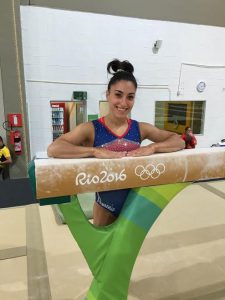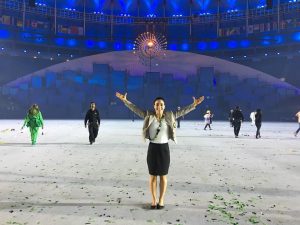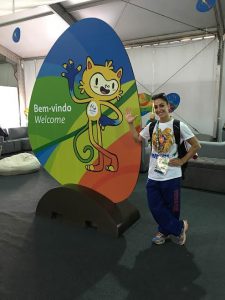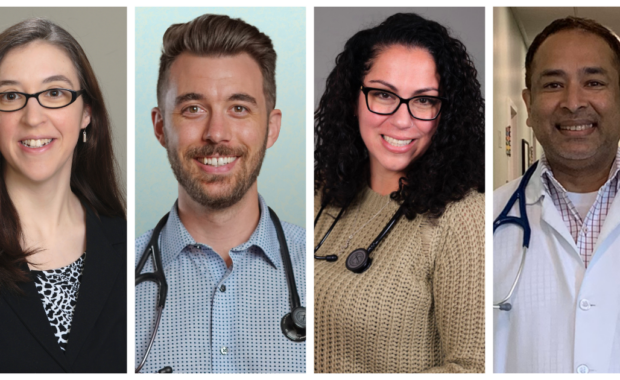Houry Gebeshian: PA School Grad, Surgical PA, and Olympic Gymnast

Houry Gebeshian is a graduate of the Wake Forest PA Program, Surgical PA-C, and Olympic Gymnast competing for the Republic of Armenia. She was kind enough to agree to an interview with the Student Academy of AAPA about her experiences in PA school, surgery, and gymnastics. Enjoy!
How do you manage your time to practice as a PA-C and train for the Olympic Games?
Outlining a typical work day is the best way to understand how I manage my time. It is very challenging to work full-time as a physician assistant, train full-time as an Olympic gymnast, fund yourself, coach yourself, and balance everything else life throws at you. However, nothing is impossible.
I am a surgical physician assistant. I work on the labor and delivery floor at Cleveland Clinic’s Fairview Hospital. I do History and Physical exams on patients that come to the hospital to have their baby as well as assist in the operating room with any obstetric related surgical cases. The majority of operations I assist with are cesarean sections (C-sections). I work a 24-hour shift on Sunday and a 16-hour night shift on Wednesday night, which adds up to a 40-hour full-time work week. Labor and delivery is very unpredictable so I always have to be alert and on my toes. Fortunately, I work with an excellent team of healthcare providers who help to move patients along safely.

A typical work day will end at 7 am. I will take a 3-hour nap from about 7:30 am – 10:30 am then head straight to the gymnastics gym. I will then put myself through a grueling 4-5 hour practice, usually alone in the gym. I’ll get home around 5-5:30 pm and start making dinner. My favorite part of the day is when my fiancé and I sit down for dinner and catch up on each other’s days. After dinner, I usually work on the computer doing promotional things, homework for my social marketing class, workout plans, meal ideas, writing e-mails, catching up on bills, or other general life tasks. I try and get to bed by 10:30 pm. Lucky for me, I have the next couple of days to recover before working again so I allow myself to sleep in a bit before doing it all over again!
Do you find any similarities between gymnastics and practicing medicine as a PA?
The most significant thing that has carried over from my career as an elite gymnast to my career as a physician assistant is my attention to detail. In gymnastics you have to be precise for two reasons. For one, you are being judged on how perfectly you can execute your routines. However, more importantly, you have to be very exact in order to not get hurt. If you do one wrong move or lose focus for just one second, you could seriously injure yourself. I use this mentality toward my patient care. I listen to my patients with careful attention, I determine a plan through meticulous analysis, and I work with my patients to execute my thoughts to achieve our goal. Specifically, in the operating room, we have to work with precision to minimize bleeding and complications. Similar to gymnastics a mistake can have catastrophic consequences, so I believe that this exactness is absolutely necessary.
What led you to the PA profession?
What really attracted me to the profession was the flexibility. Like most people I didn’t know that a career as a physician assistant event existed. I first wanted to be an athletic trainer, then a physical therapist, then a physician, but none of those seemed to fit right for me. I then learned about the physician assistant profession my junior year of college from a teammate and I knew this was the career for me. A career as a physician assistant allows enough flexibility to be involved and passionate about medicine but also be involved and passionate in other parts of your life. For me, this career choice allowed me the opportunity to work full-time as a healthcare provider but also train full-time as an elite gymnast, both things that I am very enthusiastic about.

What advice do you have for PA students currently in school?
PA school is the most challenging two or three years of your life but know that it’s only a couple of years. Commit yourself to the schooling for those two years and know that there is a light at the end of the tunnel even if you don’t see it. Even if you don’t want to study, study. My most important advice is to really learn the material. Learn the why and how the science works, do not just memorize the material for exams. Everything you learn is valuable and you will use it once you are a PA. During your second year, do not be afraid to be “annoying”. Ask as many questions as you can. Do as many things as you can and see as many patients as you can when you are a student. This is the best career choice you could have made and you will be rewarded by starting your career very soon!
What can PA students look forward to when they finish school?
Finally starting the career you’ve worked so hard to master in school. It’s worth it. I’m biased, but the physician assistant career is the best one out there!
How does it feel to be the first Armenian gymnast in Olympic history?
It is truly an honor and a privilege to have the opportunity to be the first female gymnast to represent the Republic of Armenia. This has been such an incredible experience and I hope through my successes, more Armenian female gymnasts will be able to follow in my footsteps.
What events will you be competing in and how can we follow you and your story?
I do artistic gymnastics. I will compete on August 7 at 10:30 am eastern time zone. My event order will be bars, beam, floor, vault. You can also follow me on all of my social media.

- Facebook: Houry Gebeshian Armenia Gymnast
- YouTube: Houry Gebeshian
- Instagram: @HouryGebeshian
- Twitter: @HouryGebeshian
Thank you for reading AAPA’s News Central
You have 2 articles left this month. Create a free account to read more stories, or become a member for more access to exclusive benefits! Already have an account? Log in.




